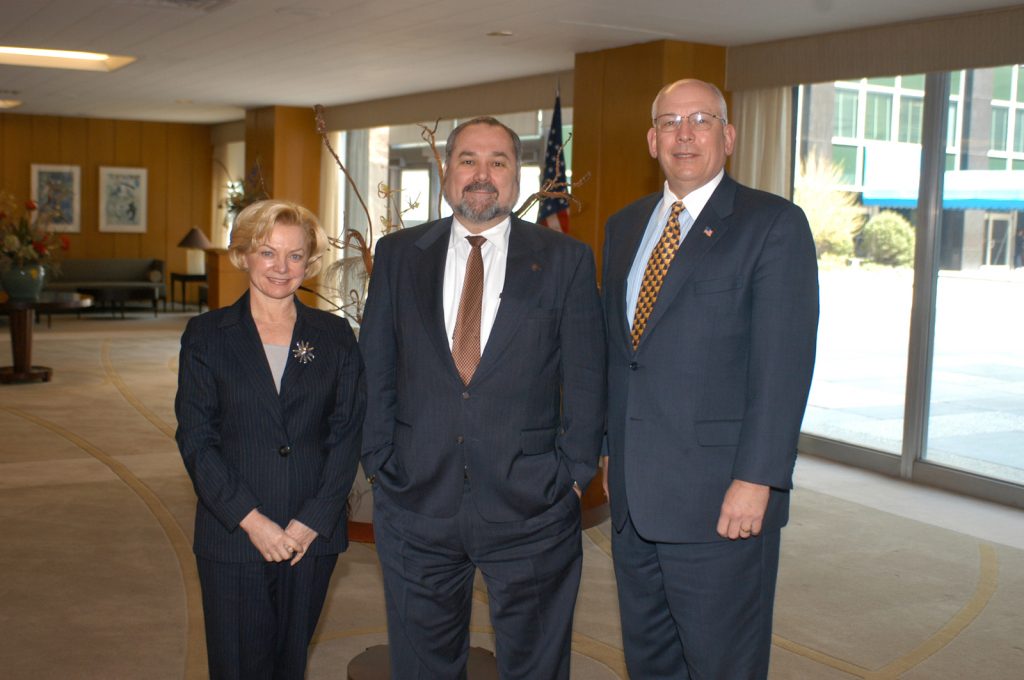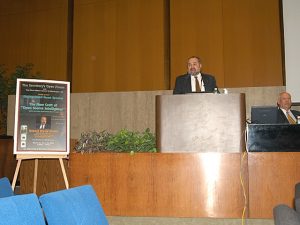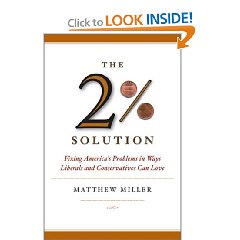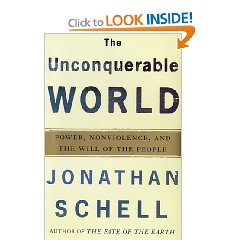
2004 Department of State (March)
Briefings & Lectures, Diplomacy, Intelligence (Commercial), Intelligence (Public)2004 ANALYSIS: All-Source Analysis, Making Magic
Briefings & Lectures, Intelligence (Collective & Quantum), Intelligence (Commercial), Intelligence (Government/Secret), Intelligence (Public)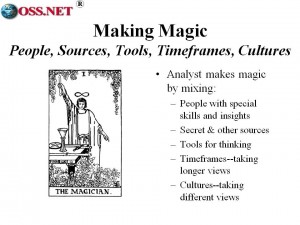
Technology is not a substitute for thinking. Memorize this sentence, the last sentence in Jim Bamford's book, BODY OF SECRETS: Anatomy of the Ultra-Secret National Security Agency (page 613, literally the last sentence in the book, note the last three words:
“Eventually NSA may secretly achieve the ultimate in quickness, compatibility, and efficiency–a computer with petaflog and higher speeds shrunk into a container about a liter in size, and powered by only about ten watts of power: the human brain.”
Review: The Health of Nations–Society and Law beyond the State
6 Star Top 10%, Consciousness & Social IQ, Crime (Government), Diplomacy, Empire, Sorrows, Hubris, Blowback, History, Intelligence (Public), Peace, Poverty, & Middle Class, Philosophy, Public Administration, Secession & Nullification, Strategy, Survival & Sustainment, Truth & Reconciliation, Values, Ethics, Sustainable Evolution, Voices Lost (Indigenous, Gender, Poor, Marginalized)Of the 1000+ books I have reviewed on Amazon, this is one of a handful that can be considered truly revolutionary. Three others that come instantly to mind are those by Jonathan Schell, The Unconquerable World: Power, Nonviolence, and the Will of the People, William Greider, The Soul of Capitalism: Opening Paths to a Moral Economy, and E.O. Wilson, The Future of Life.
This book is not an easy read. The author, a Professor of Law in the University of Cambridge, wrote an earlier work, Eunomia: New Order for a New World, that has remained similar obscure, and that is a pity, for what I see here is a truly brilliant mind able to suggest that the Congress of Vienna, the current law of nations, and the de-humanization of state to state relations, isolating the internal affairs and inhumanities of state from global public morality and indignation, are the greatest travesty in human history.
The author joins William Greider in suggesting that the state as a corporate personality is as immoral (and irrational in terms of natural law) as is the corporate personality that allows corporations to treat humans as “goods.” In this book the author sets out to do nothing less than logically overturn centuries of absolutist amoral power institutionalized by elites in the form of state governments with sovereign rights divorced from and with eminent domain over their subjects (vice citizens), and to propose a new form of globalized human society that restores the human aspect to relations among peoples and among nations of peoples.
This is a book that requires patience. It must be slowly and methodically absorbed. The footnotes are quite extraordinary, as is the summative and explicatory survey of many different literatures over many different historical periods.
The author is critical of universities for failing to develop the public mind, and offers a lovely exposition of how sanity, insanity, and public consciousness are all subject to the mythology of capitalism and the manipulation of the elites–in this he would find fellow travelers (smile) in Chomsky and Vidal. He concludes that diplomacy (and statecraft) as an articulation of the public mind and public interest have *failed*, and looks instead to some sort of social re-ordering from the bottom up.
This book, apart from offering an enlightened vision of the law as a living thing able to encapsulate changes morality and changing interests among parties, does nothing less than reconceptualize international relations. This author is to the law of nations what Vaclav Havel was to communism.
He touches on a point Henry Kissinger makes in the last of his books I reviewed (Does America Need a Foreign Policy? : Toward a Diplomacy for the 21st Century), and specifically that “The risk now facing humanity is the globalizing of the all-powerful, all-consuming social systems, without the moral, legal, political and cultural aspirations and constraints, such as they are, which moderate social action at the national level.” The world, in essence, has become much too complex and much too volatile and much too dangerous for archaic state-level forms of mandarin governance.
In the middle of the book, the author's review of how Germany previously collapsed into a patchwork of insignificant nations sounds all too much like the United States of America, where citizenship is losing its value, tyrannical minorities are in isolation from one another (and from reality), and the sense of national identity is too easily captured by a handful of neo-conservatives (modern Nazis). Interestingly, as with Havel, he notes the importance of art and culture as a means of synthesizing national identity, and would probably agree with E.O. Wilson (“Consilience”) as to the humanities being vital to the context and conduct of the sciences. His list of national “diseases” is both disturbing and timely.
He joins Jefferson and the founding fathers in focusing on the health and happiness of the people as the ultimate organizing principle (some would translate “happiness” as “fulfillment”, a more accomplished and less frivolous objective).
On page 137 he is quite clear in suggesting that capitalism as it is practiced today, is nothing less than a form of totalitarianism, and he goes on to say on page 139 that social evil is the greatest challenge facing humanity today. Instead of socializing individuals into the reduced status of “goods” we should be socializing the state into a representative and general democracy by rehumanizing humanity and rehumanizing the organizations that are supposed to provide collective voice to the people.
In following pages the author provides a brilliant catalog of the ills of democracy, reconceptualizes democracy as being based on the rule of law (for all) rather than on who rules (for the benefit of the few), and he explicitly condemns the largely unaccountable forms of concentrated power (by which we take to mean the World Trade Organization, the International Monetary Fund, and other devices for perpetuating immoral capitalism irrespective of local needs).
The full force of the author's thinking comes into full stride in the concluding portions of the book as he integrates new concepts of international law, history, social relations, and new forms of intergovernmental relations truly representative of the species as a whole and the people as a moral force. He laments the manner in which an extraordinarily global elite has been able to “separate” people from morality and from one another, leading to a common acceptance of five intolerable things: 1) unequal social development; 2) war and armaments; 3) governmental oppression; 4) physical degradation; and 5) spiritual degradation.
The author concludes by proposing a new view of the human world, and his remarks must be read in the original. He ends, as do Will and Ariel Durant in their summative “The Lessons of History,” by noting that the necessary revolution is that which must take place in our minds, not on the streets.”
This is an utterly brilliant book that has been badly marketed and is grossly under-appreciated, even by the so-called intelligencia. I recommend it to anyone who wishes to cast off their slave clothes, stop being a drone, and live free.
More recent books that fully validate this superb work, with reviews:
Failed States: The Abuse of Power and the Assault on Democracy
The Battle for the Soul of Capitalism: How the Financial System Underminded Social Ideals, Damaged Trust in the Markets, Robbed Investors of Trillions – and What to Do About It
Running on Empty: How the Democratic and Republican Parties Are Bankrupting Our Future and What Americans Can Do About It
Global Assemblages: Technology, Politics, and Ethics as Anthropological Problems
A Power Governments Cannot Suppress
Review: The Two Percent Solution–Fixing America’s Problems in Ways Liberals and Conservatives Can Love
5 Star, America (Founders, Current Situation), Best Practices in Management, Change & Innovation, Congress (Failure, Reform), Democracy, Economics, Education (General), Executive (Partisan Failure, Reform), Future, Intelligence (Public), Justice (Failure, Reform), Peace, Poverty, & Middle Class, Survival & SustainmentThis book is politically and economically *explosive*. It joins The Radical Center: The Future of American Politics (Halstead & Lind) and The Cultural Creatives: How 50 Million People Are Changing the World (Ray & Anderson) as one of my “top three” in domestic US political economics, and it *also* joins The Soul of Capitalism: Opening Paths to a Moral Economy (William Greider) and Rogue Nation: American Unilateralism and the Failure of Good Intentions (Clyde Prestowitz) is my “top three” for international political economics.
This is a cross-over, transformative book that should be meaningful to everyone in the world, but especially to those Americans who wish to break out of the vicious downward spiral caused by partisan politics and voodoo economics–by elected politicians corrupted by special interests and consistently selecting short-term fraudulent “solutions” at the expense of long-term *sustainable” solutions.
By “2% solution” the author means 2 cents of every dollar in the national budget, or roughly what we have already wasted or committed to waste on the misbegotten Iraq invasion and occupation. The author crafts a viable proposition for thinking really big and coming to grips, in time to avert the looming disaster of the baby boomer pensions and the collapse of health care and education, with the four biggest issues threatening the national security and prosperity of the United States of America: universal health care; equal education for all, a living wage for all, and sustainable reliable pensions for all.
He sums it up in a gripping fashion: if we don't fund smart well-educated kids across the entire country, then we will not have the productivity we need to expand our pension funds and care for the boomers when they hit retirement. Smart kids now, safe retirement for today's adults. Any questions?
He is candidly (but politely) blunt when he states, and then documents, that both the Republican and Democratic party leaders (less Howard Dean) are lying to us about the answers that are possible (Prologue, page xiii). His book is an earnest–and in my judgement, hugely successful–attempt to create what the author calls an “ideologically androgynous” agenda for achieving social and economic justice in America with a commitment of just two cents on the tax-revenue dollar.
On the issue of teaching, he documents the “teacher gap” as one of the primary reasons for varying levels of performance–a gap that is more important than genetics or environment, and that is also resolvable by sound educational policy and funding. He brutally undresses both the Bush Administration, which is leaving every child behind, and the Democrats, who are “more symbol than cure.” Republican hypocrisy and Democratic timidity receive an equal thrashing.
On living wages, he documents the 25 million that are not covered; on pensions he documents the coming collapse of Social Security and other “off budget” and unprotected funds.
He provides four reasons why we have a dysfunctional debate (and one can surmise: why we need to change the Presidential election process in order to achieve truly open and substantive debates): 1) paralysis from political party parity; 2) old mind-sets and habits shared by *both* Republican and Democratic leaders (less Governor Dean); 3) the failure of the national press to be serious and critical and to contribute to the debates; and 4) the tyranny of charades funded by political contributions.
The book includes an excellent and understandable review of both economic and social justice theory. Of special interest is the author's discussion of the Rawls Rule for social justice, which is to imagine everyone in an “original position” behind a veil of ignorance where no one knows what their luck will be in the future–the design of the social safety net should provide for the amelioration of any injustice that might befall anyone, and a social promotion system that prevents wealth concentrations that are not beneficial to the larger society–to wit, we must “set some limits on the power of luck to deform human lives.”
The author concludes the book by suggesting that the public is ready for a revolution in U.S. political economic affairs, and in so doing points out how ill-served the U.S. public is by surveys that confuse myopia with honesty–surveys that ask generic questions without revealing the scope of the problem (40 million affected, etc.) with the result that the public is not informed of the depth of the problem–or, as the author suggests–they would *want to do something about it.”
This is a sensible, heartening book. It is a book that gives hope for the future and that displays a proper respect for the good intentions and ability to think of the average citizen. It is a book that, if adopted by any Presidential candidate–or by all of them–could radically alter the public debates that lie before the public in the period leading up to the 2004 election. Every American should read this book and the four books cited above. If Thomas Jefferson was correct when he said, “A Nation's best defense is an educated citizenry,” then Matthew Miller just became the first tutor to the new Nation.
New Comment: Between a Tobin tax on every Federal Reserve transaction, an end of income taxes on individuals, and this author's idea, I am quite certain that we can find and apply a trillion a year against global and domestic high-level threats from poverty to transnational crime, while winding down the military, secret intelligence, prison, and hospital complexes. This is one of the books I would recommend the next President read sooner than later.
See also, with reviews:
One from Many: VISA and the Rise of Chaordic Organization
The Tao of Democracy: Using Co-Intelligence to Create a World That Works for All
Breaking the Real Axis of Evil: How to Oust the World's Last Dictators by 2025
The Fortune at the Bottom of the Pyramid: Eradicating Poverty Through Profits (Wharton School Publishing Paperbacks)
The Wealth of Networks: How Social Production Transforms Markets and Freedom
Revolutionary Wealth: How it will be created and how it will change our lives
Review: The Unconquerable World–Power, Nonviolence, and the Will of the People
7 Star Top 1%, America (Anti-America), Asymmetric, Cyber, Hacking, Odd War, Consciousness & Social IQ, Cosmos & Destiny, Democracy, Empire, Sorrows, Hubris, Blowback, Future, History, Insurgency & Revolution, Intelligence (Public), Military & Pentagon Power, Peace, Poverty, & Middle Class, Philosophy, Public Administration, Values, Ethics, Sustainable Evolution, Voices Lost (Indigenous, Gender, Poor, Marginalized)Edit of 21 Dec 07 to add links
This book, together with William Geider's The Soul of Capitalism: Opening Paths to a Moral Economy, and Mark Hertsgaard's The Eagle's Shadow: Why America Fascinates and Infuriates the World, in one of three that I believe every American needs to read between now and November 2004.
Across 13 chapters in four parts, the author provides a balanced overview of historical philosophy and practice at both the national level “relations among nations” and the local level (“relations among beings”). His bottom line: that the separation of church and state, and the divorce of social responsibility from both state and corporate actions, have so corrupted the political and economic governance architectures as to make them pathologically dangerous.
His entire book discusses how people can come together, non-violently, to restore both their power over capital and over circumstances, and the social meaning and values that have been abandoned by “objective” corporations and governments.
The book has applicability to Iraq, Afghanistan, and other places where the US is foolishly confusing military power with political power. As he says early on, it is the public *will* that must be gained, the public *consent* to a new order–in the absence of this, which certainly does not exist in either Iraq or Afghanistan, no amount of military power will be effective (to which I would add: and the cumulative effect of the financial and social cost of these military interventions without end will have a reverse political, economic, and social cost on the invader that may make the military action a self-inflicted wound of great proportions).
Across the book, the author examines three prevailing models for global relations: the universal empire model, the balance of power model, and the collective security model. He comes down overwhelmingly on the side of the latter as the only viable approach to current and future global stability and prosperity.
A quote from the middle of the book captures its thesis perfectly: “Violence is a method by which the ruthless few can subdue the passive many. Nonviolence is a means by which the active many can overcome the ruthless few.”
Taking off from the above, the author elaborates on three sub-themes:
First, that cooperative power is much greater, less expensive, and more lasting that coercive power.
Second, that capitalism today is a scourge on humanity, inflicting far greater damage–deaths, disease, poverty, etcetera–that military power, even the “shock and awe” power unleashed against Afghanistan and Iraq without public debate.
Third, and he draws heavily on Hannah Arendt, here a quote that should shame the current US Administration because it is so contradictory to their belief in “noble lies”–lies that Hitler and Goering would have admired. She says, “Power is actualized only where word and deed have not parted company, where words are not empty and deeds not brutal, where words are not used to veil intentions but to disclose realities, and deeds are not used to violate and destroy but to establish relations and create new realities.”
Toward the end of the book the author addresses the dysfunctionality of the current “absolute sovereignty” model and concludes that in an era of globalization, not only must the US respect regional and international sovereignty as an over-lapping authority, but that we must (as Richard Falk recommended in the 1970's) begin to recognize people's or nations as distinct entities with culturally-sovereign rights that over-lap the states within which the people's reside–this would certainly apply to the Kurds, spread across several states, and it should also apply to the Jews and to the Palestinians, among many others.
On the last page, he says that we have a choice between survival and annihilation. We can carry on with unilateral violence, or we the people can take back the power, change direction, and elect a government that believes in cooperative non-violence, the only path to survival that appears to the author, and to this reviewer, as viable.
This is a *very* important book, and it merits careful reading by every adult who wishes to leave their children a world of peace and prosperity. We can do better. What we are doing now is destructive in every sense of the word.
Other recommended books with reviews:
The Wealth of Networks: How Social Production Transforms Markets and Freedom
The Fortune at the Bottom of the Pyramid: Eradicating Poverty Through Profits (Wharton School Publishing Paperbacks)
Breaking the Real Axis of Evil: How to Oust the World's Last Dictators by 2025
Faith-Based Diplomacy: Trumping Realpolitik
Day of Reckoning: How Hubris, Ideology, and Greed Are Tearing America Apart
The Global Class War: How America's Bipartisan Elite Lost Our Future – and What It Will Take to Win It Back
A Foreign Policy of Freedom: Peace, Commerce, and Honest Friendship
Review: Defense Facts of Life–The Plans/Reality Mismatch
6 Star Top 10%, Congress (Failure, Reform), Corruption, Crime (Corporate), Crime (Government), Economics, Empire, Sorrows, Hubris, Blowback, Executive (Partisan Failure, Reform), Force Structure (Military), Impeachment & Treason, Intelligence (Public), Military & Pentagon Power, Power (Pathologies & Utilization), Strategy, Survival & Sustainment, Values, Ethics, Sustainable EvolutionComment: This book should be updated and reprinted in time for November 2008.
Chuck Spinney, who made the cover of TIME in the 1980's as a whistle-blower on defense waste and mismanagement, has in this book presented a readable, well-documented and well-illustrated account of how virtually every single weapons and mobility system now in the Pentagon system is over-priced, over-weight, over-budget, and not able to perform as advertised. Although out-of-print, there are hundreds of copies of this book that can be obtained via Amazon's used book channels, and the author is writing a sequel that will be easier to understand if this book is digested first.
In addressing the plans reality mismatch, the author is very effectively demonstrating that doctrine, technology and the budget are completely divorced from both real world threats, and real world logistics.
With superb assistance from the editor, James Clay Thompson, who has converted the author's Pentagon-speak to plain English, the author documents the insanity and the irresponsibility of how we continue to spend the taxpayer dollar on so-called defense. I say so-called because the Emperor has no clothes. We can invade a country, but we cannot stop terrorism or keep our electrical system going reliably.
Just one little vignette illustrates how jam-packed this book is with facts. Discussing the F-15 and the move toward replaceable units as a means of reducing forward-deployed repair specialists and spare parts, the author blows the lid off the whole system. It all comes down to the three computers each squadron of 24 F-15's needs to diagnose its 1080 line-replaceable units. 1) It turns out the three computers work 80% of the time. 2) It takes up to 30 minutes to connect the computer to an interface test adapter. 3) It takes an average of three hours and as many as eight hours for the computer to carry out a diagnostic reading of a single line-replaceable unit. 4) Very often the computer fails to replicate the problem, with lack of resolution fluctuating at between 25 and 41 percent of the time. 5) At the time Spinney wrote the book, and probably still today, not a single Air Force avionics technician was re-enlisting, because they could get three times the money, and a much better quality of life, by taking their taxpayer-funded training into the private sector.
Spinney ends his book by saying, “In a nutshell, Pentagon economics discount the present and inflate the future. Put another way, the future consequences of today's decisions are economically unrealistic plans that reduce current ability to meet the threat in order to make room (hopefully) for future money to meet a hypothetical threat. … The across-the-board thrust toward ever-increasing technological complexity is simply not working.”
It is not the book's purpose to propose an alternative national security strategy and a commensurate change in how America devises its concepts, doctrine, and capabilities for making war and enforcing peace, but if one reads the book by Robert Coram, “BOYD: The Fighter Pilot Who Changed the Art of War” and also the book edited by Dr. Col. Max Manwaring et al, “Search for Security: A U.S. Grand Strategy for the 21st Century,” a picture will emerge. People first, ideas second, hardware last. The ideas in this book, although ignored in the 20 years since they were first articulated, are certain to play a large role in the redesign and redirection of the U.S. national security community over the next ten years.
More recent books:
Fiasco: The American Military Adventure in Iraq
9/11 Synthetic Terror: Made in USA, Fourth Edition
The Unconquerable World: Power, Nonviolence, and the Will of the People
Vice: Dick Cheney and the Hijacking of the American Presidency
Rumsfeld: His Rise, Fall, and Catastrophic Legacy

